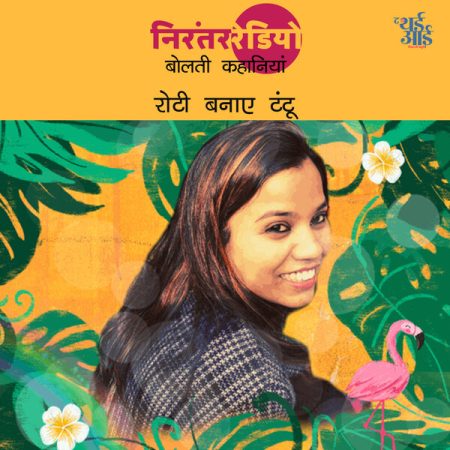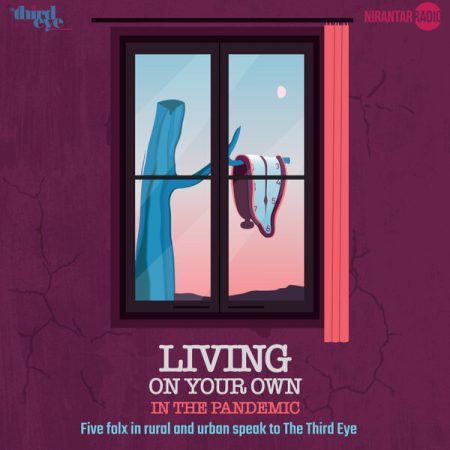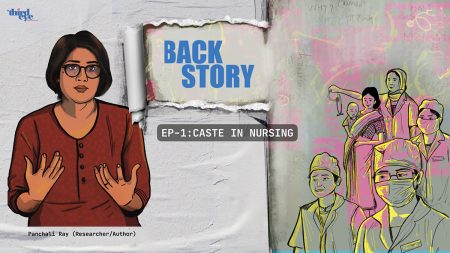I recently finished teaching a course on reality and representation in documentary cinema at Ashoka University, Sonipat. There was a mixed bag of students, across disciplines and age. Initially, this online teaching experience felt strange, unpredictable, and most definitely odd. To talk about image and image-making and their relationship to reality when we were all, in fact, one big face-in-a-box sort of a collage was as ironic as it was disconcerting. But of course, like everything else in the last year, stumbling our way through our new virtual homes, the frigidity of the computer screen thawed a little.
As part of one class assignment, the students were asked to reflect on the notion of confinement, but through someone else’s experience. In how many ways could confinement be thought of, imagined, lived, and whose confinement would you look at and why?
I must confess to be being quite astounded when nearly half the class, a rather large class by any regular film program standards, ended up filming their mothers.
Harshita
“I have been home after a long time and I am seeing my mum take care of fully grown adults all the time. Maybe all this seemed normal to me when we were in school. But now, we are all grown up and my mum is still taking care of us. The way I feel about this is very different now though,” says Harshita, a final year Sociology student.
She filmed moments that often remain unnoticed, and certainly, unrecorded. She filmed the mundane, which offers us a glimpse of her mother and a little of Harshita herself.
“It’s weird how all of us adults, including my dad, need constant looking after. Mum does all this in the most unassuming way. She never makes a big deal of doing all this work for us. I wanted this piece to reflect her very core.”
“I have somehow always accused my mum of not doing the things that she wanted to do. She wanted to learn to speak better English. She wanted to do an MBA. But she never did all of this. I always thought that she was sitting back and enjoying while ‘dad made all the money’. I have come to realise that this is immensely inaccurate and irresponsible on my part.”
In class, we often discussed the idea of ‘plot’, and whether it is at all possible to tell a story without one. And how, often, finding a plot implies seeking something ‘special’.
Our early schooling years indoctrinate us into thinking and expressing our worlds through a series of topics: ‘My first day in …’, ‘Should society be allowed to….’, ‘My favourite….’, ‘Mahatma Gandhi’! Even a random Google search throws up hundreds of ‘top ideas and topics’ for young minds, many of which even my 70-plus father recalls struggling with during his school days.
But life is made of messier things. And circuitous realisations. To project reality as a spectacle is easy, almost formulaic. To turn our gaze at the ordinary requires us to respond to our intuitive curiosities. And to address some basic questions, which often remain buried or resolved in lazy rhetoric. To see closely, intimately, asks for rigour, courage, honesty, and a willingness to engage with ourselves.
As our worlds went into lockdown, we grasped for newer meanings, newer ways of looking at us and ours in the hope of staying firm, steady, together. Harshita has gone back to Chennai to be with her parents after a long gap.
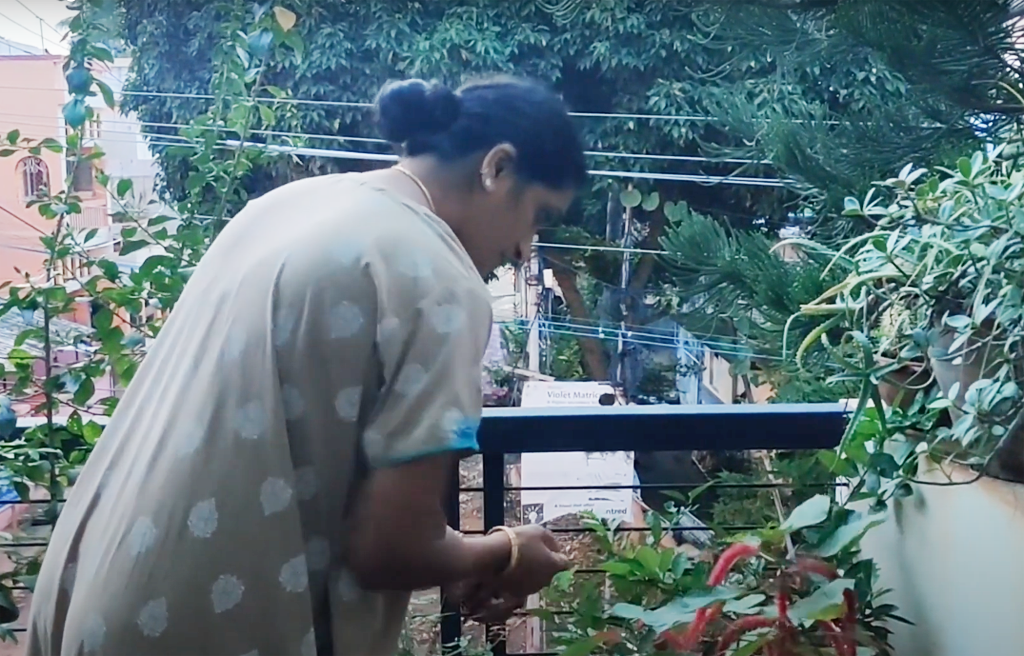
“There’s always someone else’s schedule that is on your mind. You have to keep all that in mind when you are setting time aside for yourself. So, I don’t think it’s my mum’s lack of initiative that made her give up on things she once wanted to do.”
We talk of the weight (and near total lack of acknowledgment) of social reproduction, the complete invisibilisation of women’s care work, particularly within the precincts of home.
And of the ghosts of tradition and norms that hang over us. Harshita realises that her father “… is not a chauvinist. It’s his socialisation, how he grew up, what he saw around him.”
The seeds of ‘normal’ with long, insidious roots.
“All this is so ingrained in my dad,” she says, hitting a perennially familiar note.
“It’s the way his parents functioned… my dad just can’t see it. It’s weird, but my dad would be more open to relationship advice around re-establishing some rules, from me, his daughter, than his own wife.
“He was so offended when I told him that you are treating mum in a way that is not okay. He said, ‘How can you say that. I have allowed her to do a lot of things.’ I said, see, right there is the problem. It is hard for someone who thinks they are being fair; to tell them that maybe this is not the way. And my mum is also kind of unsure…”
The process of filming inevitably reveals you, the eye behind the camera. Why do you record what you do? How do you frame your shot? What do you foreground, what comprises your margins? If you are open and attentive, it can be a dense, sometimes painful, and mostly an exhilarating process of self-realisation.
When we saw Harshita’s piece in class, everyone felt that they “…kind of, sort of, knew” her mother. Perhaps, the seemingly inconsequential gestures and words through which Harshita chooses to represent her mother are in fact so essential, so humane, that we can all identify with her. We can relate to the way Harshita is relating to her mother, to her own impulse in depicting her mother’s ‘core’. At that moment, parts of our own mothers reflect in hers.
Over time, Harshita feels that the scales have begun to shift at home. “Now that we are older, mum watches the way my sister and I make my choices, which seems to have affected the way she thinks of her own agency in her everyday. I am a Sociology major, so I bring all these big concepts to the dinner table. My mum….”Harshita pauses, her big eyes lighting up at the thought about to unfold, “…the other day, my dad was telling my mum about something that she already knew. She said to him, ‘Wait, don’t mansplain this to me.’ Then she looked at me and said, ‘Harshita, did I say that right?”
Pratul
“Through my shots, I wanted to bring out how my mother is managing everything. If she was not there, everything would have been in shambles…. she has made us feel that nothing has changed.”
At home in Lucknow due to the lockdown, Pratul is a second year student of History and International Relations. At first, his shots didn’t seem particularly ‘cinematic’. What was arresting though was his steady, direct and single-minded focus on his character. Nothing else seemed to matter.
“My mother started her business when I was in Class 11. She never thought that this would become very central to her or to our family.”
In November 2019, Pratul’s world took an unforeseen turn “My father developed a kidney condition. Both of his kidneys failed. He was working before that but now he is completely housebound. In January 2020, I was diagnosed with glaucoma. It was detected quite late. I have 80% vision in my left eye and 45-50% in my right eye. I am managing…it is not something to worry about.”
The fullness and clarity with which Pratul speaks is reflected in the way he films his mother. More often than not, an obvious sympathetic, overwrought portrayal of people in difficult contexts is a common trope in mainstream documentary narrative. But there is not a hint of pathos or anything remotely tragic in Pratul’s representation. His mother is the frame. The frame is her. Unambiguously so.
When what you film is so central to your eye (and to ours, as an audience), we wonder why it so. Who is this woman? Why am I looking at her doing routine chores? What could be her story? She is not merely a subject to be looked at- distant and remote. She is neither exemplary, nor a victim. The tightness of the framing forces the eye to seek details, and the distinct meanings that maybe embedded within.
“She has always had a knack for clothes…she has always loved stitching. I was in Class 7 when she started her business. She began reading different kinds of blogs on how to develop new businesses. Then she found these Facebook groups where people collaborated and traded and sold their stuff to each other. Then she joined some WhatsApp groups and came in touch with suppliers and vendors who trade in online markets. It expanded over time. She has great business acumen.” She works as an independent retailer now, her business supporting the family.
Pratul feels his mother has had to make some difficult choices over the years. Before her marriage, she worked as a cashier in a bank, a job she quit when he was born. “She wanted to raise me, that’s what she tells me. One of her junior colleagues is now a general manager at one of the branches of the HDFC bank. She was doing well for herself, and she may have become something important in her field. But she left it all to bring me up.”
Things are far from easy now. “She has deadlines, she has commitments that she has made to the clients that she has to stick to or follow up on. You would understand this, you are a professional.”The clarity with which Pratul speaks of his mother, this moment in their lives alerts you to his prescience.
“One thing I feel is that she can’t really tell everyone that this is going on in my house, and that I need extensions, or that I cannot pick up your call right now. She has to keep those professional commitments of hers. But things are very critical at home, and they change from hour to hour. So my father would be feeling all right now, but in two hours or so, he may begin to feel tired. He will need to lie down…he is in pain. Then my mum needs to look after him. But if a call comes from a client, she can’t say that I can’t attend to this call now, or that I am looking after my husband…or my son.”
“She has to pick up the call and she has to curtail those emotions because it is professional work and no one will understand. Even if she has to accompany my father for dialysis, she is sitting in the waiting area and she is getting calls after calls. She can’t possibly say that she is out for the next six hours…that she will call the clients back at night. That’s not how things work professionally. So, that is one big challenge I find that she has to address. That’s where her worlds collide.”
How does one capture a feeling on camera? What Pratul shares about his mother, their domestic life is not overtly evident in his shots. We don’t have the classic ‘interview’ with the ‘subject’ where she talks elaborately about her daily struggles, or the often abused ‘self reflective’ shot of the narrator himself where he expresses his anxieties out loud (over a reflection on a wall; sunlight filtering through a lattice of leaves; rippling water….an endless stock of predictable shots meant to ‘fit’ in anywhere, everywhere- empty and barren in meaning- their only purpose being to either fill time or give space for narrative movement).
One of the most abstract and hence challenging concepts to discuss in class for me has always been the notion of duration while filming. How do you know when to cut a shot? Today, when our visual vocabulary is vastly shaped by the norms prescribed by various social media platforms, our notion of time has itself shrunk. When we make images, we look impatiently, anxiously, and fleetingly in the fear that we are missing out on seeing more. Or worse- if we look for longer, will it dull our audience? Will they look away?
Mehek
“My mum, ever since I can remember, has always tried to keep herself busy and occupied with something or the other. The food business is something we have always wanted her to pursue because she is the best cook in the family, though she has never taken it seriously. But in January, she became part of various home cooking WhatsApp groups. She started attending potlucks and other food events. Once the lockdown happened, she finally took this step. She set up an Instagram account; she made a menu, started taking food orders. Of all the businesses she has done over the years, we have been most excited about this.”
Currently in her second year, Mehek is majoring in Economics and Fine Arts. Like Harshita and Pratul, she has been home in Mumbai through the lockdown. Her mother, she tells me, tried her hand at various ventures over the years, but finding herself torn between home and work, gave them up along the way. Even though she enjoyed, “…all the freedoms, she decided to make certain choices. Mainly, to fend for us,” says Mehek.
Like Pratul, Mehek films her mum comfortably, unhurriedly. One shot, over four minutes or so. This is the “first time” that she has been home for so long. The first time that she has “really closely seen” her mother working on something. She translates this observation, as if verbatim, into her images. She wants to show us what she has seen- the labour and thoughtfulness that goes into her mother’s food. She tries to describe her mother’s agile hands with matching precision and care (fetching the almonds from the kitchen, foregrounding them while walking back to her mum- all this is very important for Mehek to film, just so we, the audience, know and register it too).Their off camera conversation anchors us to the moment.
“Every evening after dinner, I sit with my mum and she tries out something new, she experiments with what her food should look like, what form will suit it the best just like I showed in my shot. She gauges what works best, tries out different recipes and then she calls me to taste it and asks, ‘How is it?’ So that has become like a bonding point for us.”
Her own life choices though, Mehek feels, would be very different from her mother’s. “Even now, when I tell my mum that I may consider marketing as a career one day, a field that requires you to travel a lot, her first reaction is, ‘But then what about your home? Who will look after your home?’ But for my sister and me it is a very simple option. We could just hire more help at home or come to some other solution. But the first response should not be that I give up something that I like to just because who will look after home. And that doesn’t mean that I care less about my home.”
Despite the differences, Mehek realises that her mum’s work has allowed for possibilities where none seemed to exist in the past. “I can’t exactly say how this happens, but because of her work, I am able to have a political discussions with my father…acivilized political discussion.”
Mehek recalls how during the “NRC and CAA days” her father and she could not see eye to eye on anything. “My father once told me that given your sympathetic position on this, if your grandfather was alive, he would have thrown you out of the family. That’s when we decided that politics was off the table if we wanted to maintain our father-daughter relationship. But somehow, today, when we all discuss my mom’s work, we always talk about the bigger picture in a sense, and that allows for many different kinds of conversations to take place.”
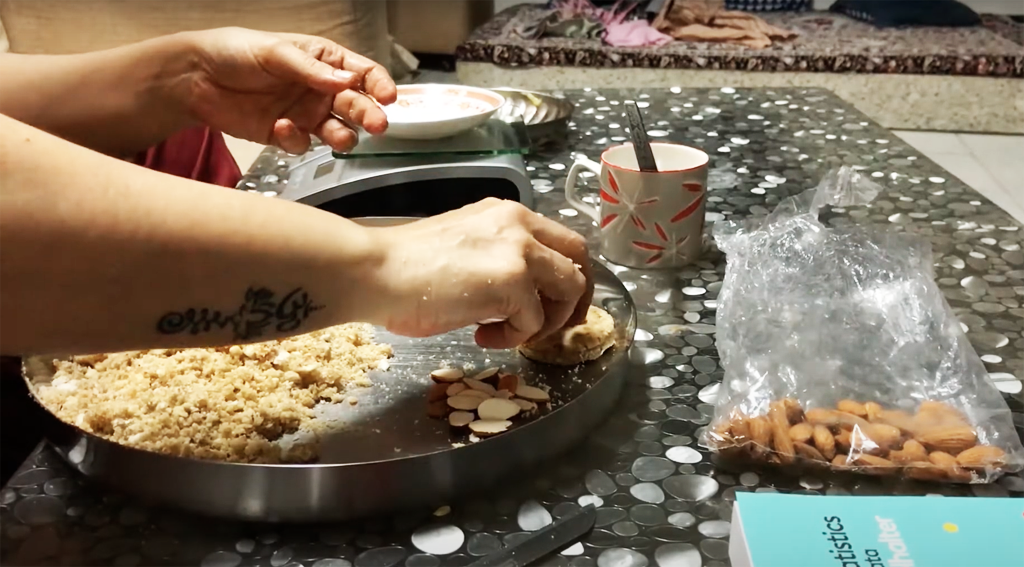
Why has this become possible? Perhaps because something like food is inherently political- from what it comprises to how it is consumed? It forces us to think, have these conversations, seemingly benign, and accept who we are, our prejudices and our generosities all at the same time? “Yes, maybe. I don’t know why, but it has.”
In fact, some feminist educators have used food as a means to open up conversations around body and sexuality. Nirantar’s Hindi publication, Khulti Partein: Yonikta aur Hum (‘Unfolding the Layers: Sexuality and Us’) that emerged out of a series of workshops with various women’s groups uses the metaphor of food to talk about how we make certain sexual choices, what informs our decisions, our likes and dislikes and our notions of pure and impure. Our desires are as diverse as our culinary tastes. Much in the way that some people prefer vegetarian food to others, people too make certain sexual choices. And just like our taste in food changes over the years, so could our sexual preferences. What we eat is a part of our socialisation, our conditioning, as is our sexuality. Our food habits are determined by our class, caste, socio-economic background, as is our sexual temperament.
Mehek’s eyes light up as we talk more about her mother’s journey through food. And how much closer they all are today because of her work. It’s not as if she sees a clear, reasoned out connection. But she senses it. Feels it in her bones. And tries to capture it by filming her mother with as much attention and detail as she can. Perhaps you should make a film about this someday, I say. We laugh. Perhaps she will.
(Kaam ya Aaraam Series)



